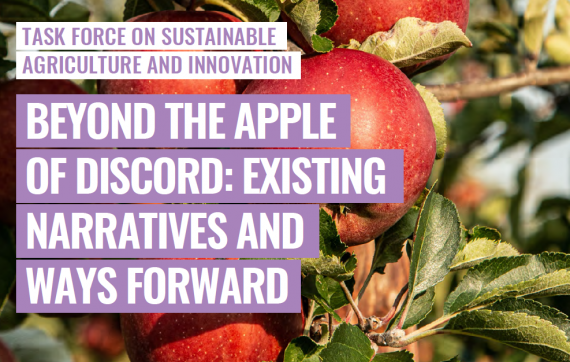Beyond the Apple of Discord: Existing Narratives and Ways Forward
(click on the title above to download the full report)
Europe needs more sustainable food systems to cope with dramatic changes to our natural environment, economic instability, and rapid societal transformation. The issue is extremely complex, involving many dimensions and multiple objectives such as feeding a growing global population, ensuring food safety, mitigating climate change and environmental degradation, guaranteeing the development of rural areas, promoting economic growth, and equalizing the chances of different farming models. To address all these challenges, to find the best solutions, and above all to bring Europeans together in support of these solutions we need a new ecosystem for the debate that recognizes not only the multidimensionality of the issues at hand, but also the complexity and intensity of the corresponding public discourse.
To better understand public knowledge and perceptions of these issues, we took a closer look at how different stories, symbols, images, and metaphors are used to inform the debate on the future of European agriculture. We have adopted a narrative approach because it provides the tools to examine the structures hidden behind individual arguments. Vast scientific literature in various fields suggests that individual facts are usually communicated through a few basic narrative schemas – although the number of stories is large, they usually follow a small number of narrative schemas. These ready-made stories describe typical sequences of events, but also provide a handy repertoire of images. Narrative schemas describe prototypical sequences of events, providing templates for how the world works. For example, many stories describe how good deeds are rewarded; bad behaviours are punished, while hard work, inventiveness, and risk-taking will result in success. As individuals rarely rely on fact-checking, narrative plausibility, i.e., compatibility with previously adopted narratives, is a primary factor in whether new information and ideas are accepted or rejected. Strongly defined communities are built around these kinds of stories, which often leads to polarised debate.
Image credits: Stock images are reproduced courtesy of of Unsplash.com, photo by Marek Studzinski, and do not belong to the authors nor to the organisations to which they are affiliated. All images are for illustrative purposes only. Specific thanks are extended to all the members of the Steering Committee and the Expert Committee of the RIE Task Force on Sustainable Agriculture and Innovation for their invaluable contribution and advice.
Authors: Marcin Napiórkowski, Andrzej Nowak, Peter Kearns, Erika Widegren, John Magan and Matteo Nicolosi with the support of knowledge partners: ALLEA, Pere Puigdomènech and Mathijs Vleugel; and EU SAGE, Dirk Inzé and Oana Dima.
How to cite this report: Re-Imagine Europa (2021) lead authors: Napiórkowski, M; Nowak, A.; Kearns, P.; Widegren, E.; Magan, J. and Nicolosi, M. A European Vision for Sustainable Agriculture and Innovation: Existing Narratives Shaping the Debate and Ways Forward. Brussels.
Graphic design: Fernando Hernández Puente at Rain of pixels.
